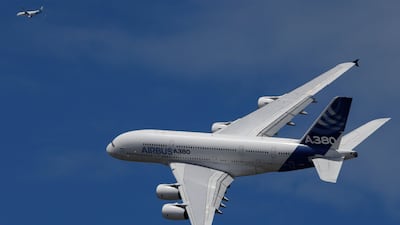Airbus turned up the heat on engine maker Pratt & Whitney over delays that have disrupted its biggest production line after reporting a sharp drop in mid-year profits on Thursday.
The head of the world's second-largest plane maker challenged the US engine maker, whose fuel-saving Geared Turbofan (GTF) engine is tied to thousands of orders for A320neo jets, to "work harder" to fix delays and reliability problems.
Airbus half-year operating profit dropped by one third on flat revenue, sending its shares down 3.7 per cent despite positive progress on the ramp-up of the wide-body A350 jet and confirmation of financial targets.
Although other engine makers, including CFM International and Rolls-Royce, have also suffered snags, the Airbus chief executive Tom Enders put the onus squarely on Pratt & Whitney to overcome its GTF problems.
"It should be a winning engine but they need to fix it," he said.
Pratt parent company United Technologies this week reaffirmed a target for 350-400 GTF deliveries this year. Airbus also reiterated its jet delivery target but added a new proviso, saying the goal was dependent on engine makers meeting their commitments.
Asked about the apparent difference in tone between the two companies, Mr Enders said: "You can assume that Airbus is fully in the picture and knows what it is talking about. If there is a difference in messaging and perception, then there is a difference, but our picture is the picture we have at Airbus and ... the situation is unsatisfactory."
Mr Enders also said Pratt engines continued to face reliability issues, forcing airlines to ground some aircraft for changes.
"Pratt & Whitney has introduced some fixes but we are still waiting for these improvements to come through," he said.
Pratt & Whitney had no immediate comment.
The Times of India reported that GoAir had started cancelling flights because some A320neo jets were grounded due to reliability problems, echoing problems at IndiGo.
Neither airline was available for comment.
Mr Enders confirmed Airbus had delivered "around 15" Pratt-powered A320neo twin-engined aircraft in the first half compared with around 100 planned for that variant in 2017.
Asked how this squared with the 134 engines that Pratt says it delivered in the first half, he said deliveries of aircraft depended on customer acceptance.
Industry sources say some airlines have been refusing to take Pratt-powered jets because of the lack of available spares.
Airbus also said deliveries of the A380 superjumbo would fall to just eight in 2019.
That compares with 15 this year and 12 in 2018 and means production of the A380 will continue to operate at what Airbus calls a marginal loss, with output set to peter out early next decade barring new sales.
Airbus is working on some sales campaigns but the probability of immediate success is "not ... necessarily high," Mr Enders said.
He said Airbus was however in "constructive talks" with Qatar Airways over a recent cancellation of four A350s, adding, "I think we will find a way out" of the issue.
Airbus' second-quarter operating profit fell 27 percent to €859 million (Dh3.7bn) on revenues of €15.27bn.
That fell short of the €910ms on revenue of €15.82bn expected by analysts polled by Reuters.
A day earlier shares in rival Boeing hit a record high after its second-quarter profit and cashflow came in well ahead of Wall Street estimates.
Reuters

